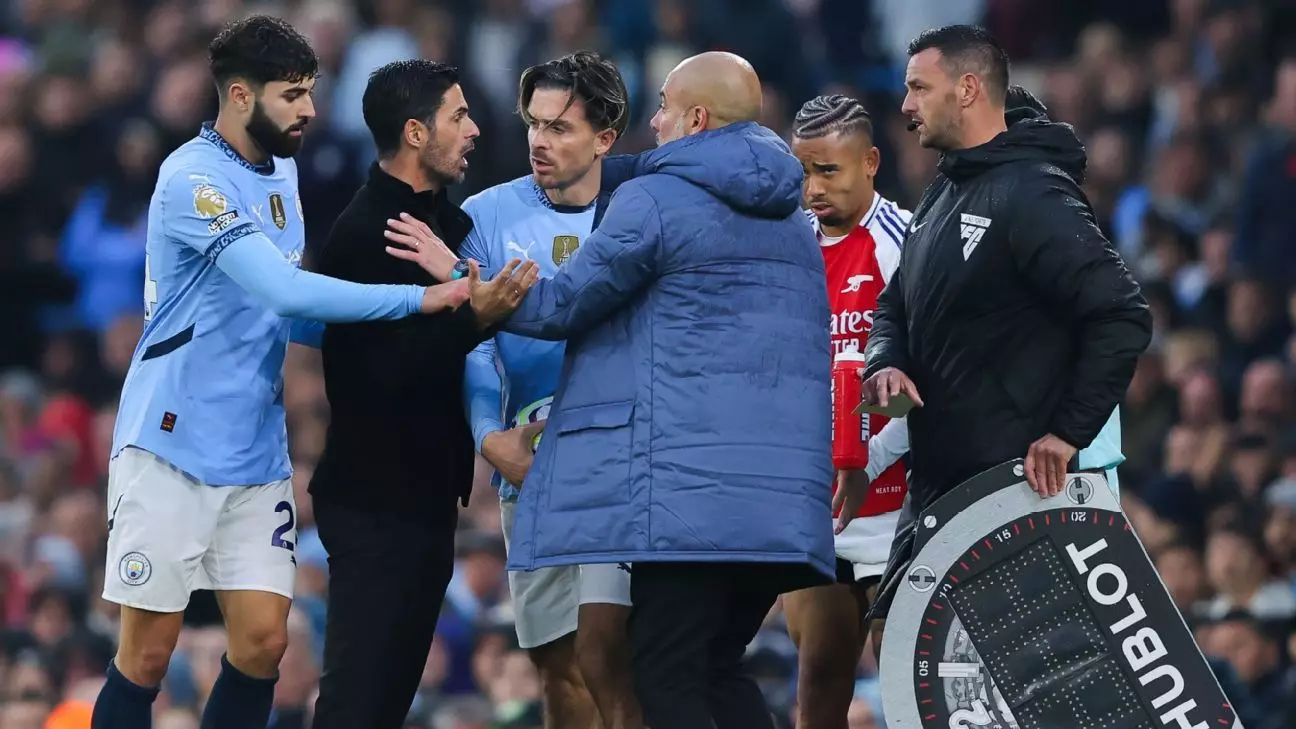Arsenal’s recent match against Manchester City not only ended in a thrilling 2-2 draw but also sparked a debate around sportsmanship and tactical maneuvering. The post-match comments from City players John Stones, Manuel Akanji, and Bernardo Silva have overshadowed the dramatic nature of the game, as they accused Arsenal of employing “dark arts”—a term often associated with gamesmanship that borders on unsportsmanlike conduct. In responding to these allegations, Arsenal manager Mikel Arteta reframed the discussion around his team’s injuries, emphasizing the realities of player fitness over conjecture about their tactics.
The match unfolded dramatically, culminating in an equalizing goal from Stones deep into stoppage time. Until then, Arsenal had fought valiantly, managing a one-goal lead with only ten men after Leandro Trossard was sent off. In the final minutes, the tactical choices Arteta made came under scrutiny. Critics argue that Arsenal’s methods were not just strategic but manipulative, aimed at frustrating City’s attempts to seize control of the match. The allegations raised by City players suggest a broader discourse on acceptable game management in high-stakes matches and whether certain actions constitute legitimate tactics or mere gamesmanship.
Arteta’s retort, advocating for facts over assumptions, shifts the focus back to the more pressing issue of squad fitness. Post-match, he noted the potential injuries faced by key players including Gabriel Martinelli and David Raya, a stark reminder of the physical toll such matches take on players. This emphasis highlights the real risks involved in competitive football, often overshadowed by tactical discussions.
Arteta’s pre-match comments ahead of the Carabao Cup tie against Bolton Wanderers showcased not only his frustration with the narrative spun by City players but also his concern for his team’s health. The mention of injuries begs the question: how much of a toll can a grueling match take on a squad that is already facing challenges? This year, Arsenal’s depth has been tested, and the potential loss of players could sever their title ambitions moving forward. By prioritizing injury concerns, Arteta is advocating for a discourse that recognizes the physical demands placed on modern players.
The situation underscores the broader implications for Arsenal — with injuries, their squad’s ability to perform consistently diminishes. Time-wasting tactics, whether viewed positively or negatively, serve as a survival mechanism for teams that find themselves under immense pressure. In football, as much as style and attacking flair matter, pragmatism often dictates success on the pitch.
The exchange between Erling Haaland and Arteta post-match, with Haaland encouraging Arteta to “stay humble,” further adds layers to the conversation around sportsmanship. In the heat of competition, players sometimes lose sight of the values they are expected to uphold. However, the psychological warfare inherent in football is part of the game; mind games and banter between players are commonplace. Responding to such provocations with poise while guarding one’s team ethos is critical for a manager like Arteta, who is still shaping Arsenal’s identity.
Arteta’s remarks about learning from past experiences and adapting his strategies reflect not just a tactical awareness but also a commitment to fostering resilience within his team. His assertion that learning from defeats—such as the heavy loss to City in August 2021—ensures that Arsenal evolves into a stronger unit is crucial in maintaining competitive advantage.
Ultimately, the discourse surrounding “dark arts” may reflect more about the fears and pressures of title challengers like Manchester City than about Arsenal’s actual playstyle. It showcases the intense rivalry where accusations can often be a defense mechanism. As the season progresses, it remains to be seen how these narratives will unfold and whether tactical debates will give way to a focus on performance and results on the pitch. Football, after all, is as much about tactics and strategy as it is about the players’ physical and mental endurance.

